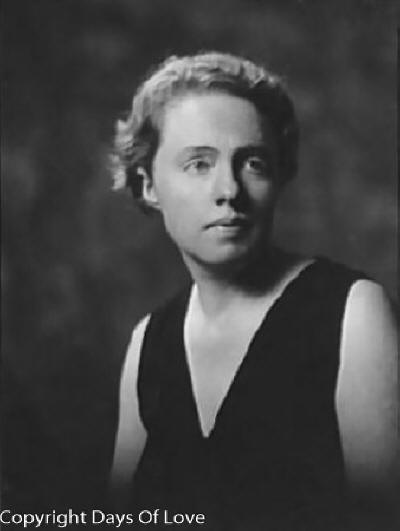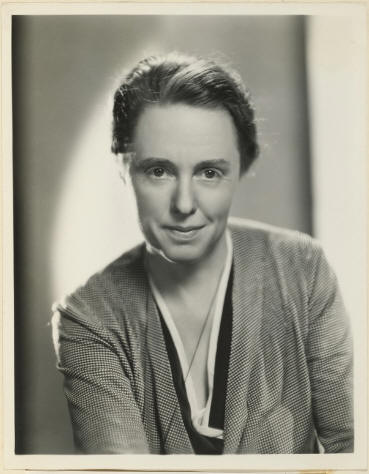

Partner Rachel Barrett, Sara Josephine Baker, Louise Pearce, buried together with Pearce
Queer Places:
Trevenna Farm, 208 Orchard Rd, Skillman, NJ 08558, Stati Uniti
 Ida
Alexa Ross Wylie (16 March 1885 – 4 November 1959), known by her pen name
I. A. R. Wylie, was an Australian-British-American novelist, screenwriter,
short story writer, and poet who was honored by the journalistic and
literary establishments of her time, and was known around the world.
She was a member of the Heterodoxy Club.
Ida
Alexa Ross Wylie (16 March 1885 – 4 November 1959), known by her pen name
I. A. R. Wylie, was an Australian-British-American novelist, screenwriter,
short story writer, and poet who was honored by the journalistic and
literary establishments of her time, and was known around the world.
She was a member of the Heterodoxy Club.
Between 1915 and 1953, more than thirty of Wylie's novels and stories were adapted into films, including Keeper of the Flame (1942), which was directed by George Cukor and starred Spencer Tracy and Katharine Hepburn.
Wylie was born Ida Alexa Ross Wylie on 16 March 1885 in Melbourne, Australia to Alexander Coghill Wylie from England and Ida Ross, a farmer's daughter from Australia.[1][2] I. A. R. Wylie's father, Alec Wylie of England, was in debt much of his life and often on the move from creditors.[2] And so it was that sometime in the 1880s he fled England for Australia, but not before divorcing his first wife while proposing to her sister, Christine (who refused).[2] In Australia, he soon married a plain farmer's daughter named Ida Ross.[2] The couple's first child, I. A. R. Wylie, was born in Melbourne, Australia in 1885, literally named after her parents: Ida Ross and Alec Wylie.[2] In 1888, Alec moved back to London with his new wife and young child, but Ida Ross died shortly thereafter.[2] Alec then renewed relations with Christine, his first wife's sister, and Christine became the young Wylie's home school teacher and guardian, raising her while her father struggled from one crisis to the next. "Christine was just the first of a line of women who proved far stronger and more reliable than any man in Ida's life."[2]
After spending three years in finishing school in Belgium, Wylie first studied in England, and later in Germany, where she also taught and began writing.[1] Wylie's self-education at home meant she spent many hours making up her own stories to fill up time, and, at the age of 19, she sold her first short story to a magazine.[2] For example, Wylie had a roommate named Esme who had been raised in India and so she wrote stories based on Esme's reminisces.[2] Wylie went on to write at least five books based in India, The Native Born, or, The Rajah's People (1910); The Daughter of Brahma (1913); Tristram Sahib (1915); The Temple of Dawn (1915); and The Hermit Doctor of Gaya (1916). While living in Germany in the early 1910s, she wrote a number of books including My German Year (1910); Rambles in the Black Forest (1911); The Germans (1911); and Eight Years in Germany (1914).[2] Her novel, Towards Morning (1918), was "perhaps the first in English to suggest that not all Germans were evil imperialists."[2]

Trevenna Farm, Skillman
In 1911, Wylie returned to England, living in St John's Wood, London[3], and joined the Suffragette movement.[2] She provided a safe house for women who were released from prison where they could recover from hunger strikes under the "Cat and Mouse Act" without being watched by the police.[2][3] She struck up a relationship with the editor of "The Suffragette", Rachel Barrett, and by mid 1913 was a useful "sub-editor and bottle-washer". She travelled with Annie Kenney, Jessie Kenney and Mary Richardson to spend a week in France with Christabel Pankhurst[3]. Wylie and Barrett then travelled to Edinburgh to Wylie's aunt Jane, where Barrett had surgery and lived under a pseudonym to avoid re-arrest. Both returned to London for Christmas 1913, and continued to secretly edit The Suffragette until May 1914, when police again raided the premises in Lincoln's Inn.[3] In 1917, Barrett and Wylie traveled to America. They bought a car and roamed around the country, from New York to San Francisco, a remarkable journey with the state of roads and cars at the time.[2]
Wylie eventually settled in Hollywood where she sold her stories.[2] Over thirty movies were made between 1915 and 1953 based on her works, including Torch Song (1953) and Phone Call from a Stranger (1952).[3] Her story, "Grandmother Bernle Learns Her Letters", published in the Saturday Evening Post in 1926, was filmed twice—by John Ford in 1928 as Four Sons, and by Archie Mayo in 1940, also as Four Sons.[2] She is probably best known as the author of the novel that became the basis of the film Keeper of the Flame (1942), directed by George Cukor and starring Spencer Tracy and Katharine Hepburn.[2]
"Neither Baker nor Wylie ever declared themselves openly as lesbians, but according to Dr. Bert Hansen’s article, "Public Careers and Private Sexuality: Some Gay and Lesbian Lives in the History of Medicine and Public Health", the Wylie and Sara Josephine Baker were partners."[2][4] Other authors have identified her as a lesbian including Laura Doan in Fashioning Sapphism: The Origins of a Modern English Lesbian Culture,[5] Anne McMay in Wolf Girls at Vassar: Lesbian and Gay Experiences 1930-1990[6] and Lesbian lives: Biographies of Women from the Ladder.[7]
In her autobiography My Life with George, in which the "George" of the title is her subconscious ego, Wylie says:
In her autobiography she acknowledges that many of her women friends refer to her as "Uncle," and as one critic says, her choice of being credited as "I. A. R. Wylie" instead of Ida Wylie was certainly an attempt to downplay her gender in publications.[2][8][4]
In the 1930s, Wylie, Sara Josephine Baker and another pioneering woman physician, Dr. Louise Pearce, settled on a property near Skillman, New Jersey called Trevenna Farm.[2] They lived there together until Baker died in 1945, followed by Pearce, and then later Wylie who died on 4 November 1959 at the age of 74. Wylie and Pearce are buried alongside each other at Henry Skillman Burying Ground, Trevenna Farm's family cemetery.[2]
My published books: